Java: Encryptable interface for AES and RSA encryption
Write a Java program to create an interface Encryptable with methods encrypt (String data) and decrypt (String encryptedData) that define encryption and decryption operations. Create two classes AES and RSA that implement the Encryptable interface and provide their own encryption and decryption algorithms.
Sample Solution:
Java Code:
// Encryptable.java
// Declare the Encryptable interface
interface Encryptable {
// Declare the abstract method "encrypt" that classes implementing this interface must provide
String encrypt(String data);
// Declare the abstract method "decrypt" that classes implementing this interface must provide
String decrypt(String encryptedData);
}
// AES.java
// Import necessary libraries for cryptographic operations
import javax.crypto.Cipher;
import javax.crypto.KeyGenerator;
import javax.crypto.SecretKey;
import java.security.KeyPair;
import java.security.KeyPairGenerator;
import java.security.PrivateKey;
import java.security.PublicKey;
import java.util.Base64;
// Declare the AES class, which implements the Encryptable interface
class AES implements Encryptable {
// Define the AES algorithm as a constant
private static final String AES_ALGORITHM = "AES";
// Declare a SecretKey to store the encryption key
private SecretKey secretKey;
// Constructor to initialize the encryption key
public AES() {
try {
KeyGenerator keyGen = KeyGenerator.getInstance(AES_ALGORITHM);
keyGen.init(128);
secretKey = keyGen.generateKey();
} catch (Exception e) {
e.printStackTrace();
}
}
// Implement the "encrypt" method required by the Encryptable interface
public String encrypt(String data) {
try {
Cipher cipher = Cipher.getInstance(AES_ALGORITHM);
cipher.init(Cipher.ENCRYPT_MODE, secretKey);
byte[] encryptedBytes = cipher.doFinal(data.getBytes());
return Base64.getEncoder().encodeToString(encryptedBytes);
} catch (Exception e) {
e.printStackTrace();
}
return null;
}
// Implement the "decrypt" method required by the Encryptable interface
public String decrypt(String encryptedData) {
try {
byte[] encryptedBytes = Base64.getDecoder().decode(encryptedData);
Cipher cipher = Cipher.getInstance(AES_ALGORITHM);
cipher.init(Cipher.DECRYPT_MODE, secretKey);
byte[] decryptedBytes = cipher.doFinal(encryptedBytes);
return new String(decryptedBytes);
} catch (Exception e) {
e.printStackTrace();
}
return null;
}
}
// RSA.java
// Import necessary libraries for cryptographic operations
import javax.crypto.Cipher;
import javax.crypto.KeyGenerator;
import javax.crypto.SecretKey;
import java.security.KeyPair;
import java.security.KeyPairGenerator;
import java.security.PrivateKey;
import java.security.PublicKey;
import java.util.Base64;
// Declare the RSA class, which implements the Encryptable interface
class RSA implements Encryptable {
// Define the RSA algorithm as a constant
private static final String RSA_ALGORITHM = "RSA";
// Declare a KeyPair to store the public and private keys
private KeyPair keyPair;
// Constructor to generate a KeyPair for encryption and decryption
public RSA() {
try {
KeyPairGenerator keyGen = KeyPairGenerator.getInstance(RSA_ALGORITHM);
keyGen.initialize(2048);
keyPair = keyGen.generateKeyPair();
} catch (Exception e) {
e.printStackTrace();
}
}
// Implement the "encrypt" method required by the Encryptable interface
public String encrypt(String data) {
try {
// Get the public key from the KeyPair
PublicKey publicKey = keyPair.getPublic();
Cipher cipher = Cipher.getInstance(RSA_ALGORITHM);
cipher.init(Cipher.ENCRYPT_MODE, publicKey);
byte[] encryptedBytes = cipher.doFinal(data.getBytes());
return Base64.getEncoder().encodeToString(encryptedBytes);
} catch (Exception e) {
e.printStackTrace();
}
return null;
}
// Implement the "decrypt" method required by the Encryptable interface
public String decrypt(String encryptedData) {
try {
// Get the private key from the KeyPair
PrivateKey privateKey = keyPair.getPrivate();
byte[] encryptedBytes = Base64.getDecoder().decode(encryptedData);
Cipher cipher = Cipher.getInstance(RSA_ALGORITHM);
cipher.init(Cipher.DECRYPT_MODE, privateKey);
byte[] decryptedBytes = cipher.doFinal(encryptedBytes);
return new String(decryptedBytes);
} catch (Exception e) {
e.printStackTrace();
}
return null;
}
}
// Main.java
// Import necessary libraries for cryptographic operations
import javax.crypto.Cipher;
import javax.crypto.KeyGenerator;
import javax.crypto.SecretKey;
import java.security.KeyPair;
import java.security.KeyPairGenerator;
import java.security.PrivateKey;
import java.security.PublicKey;
import java.util.Base64;
// Declare the Main class
public class Main {
public static void main(String[] args) {
// Create an instance of the AES class for encryption and decryption
Encryptable aes = new AES();
// Encrypt data using AES encryption and store the result
String encryptedDataAES = aes.encrypt("Java Interface.");
System.out.println("AES Encrypted: " + encryptedDataAES);
// Decrypt the AES-encrypted data and store the result
String decryptedDataAES = aes.decrypt(encryptedDataAES);
System.out.println("AES Decrypted: " + decryptedDataAES);
// Create an instance of the RSA class for encryption and decryption
Encryptable rsa = new RSA();
// Encrypt data using RSA encryption and store the result
String encryptedDataRSA = rsa.encrypt("Java Interface.");
System.out.println("RSA Encrypted: " + encryptedDataRSA);
// Decrypt the RSA-encrypted data and store the result
String decryptedDataRSA = rsa.decrypt(encryptedDataRSA);
System.out.println("RSA Decrypted: " + decryptedDataRSA);
}
}
Sample Output:
AES Encrypted: SIRcgpS5yDqD7/MhH6Q2pg== AES Decrypted: Java Interface. RSA Encrypted: ep7aeBcALwnW44f2YFl+XfWkCE8QNWblnUgOeXjI1u0gnz6pSLLZekff6wBQbujUDNjmgOYVgTyG2iGUpaH2pK5sIwH6W6vJFvIaNXb/2KzwkTYDtdpdEHV8aq+dzxKWZloID84ZQ3VUmvEa4DUpqOzrj3HhX1Lvob3jzMKQgarAMwMIF2v6Wz9O7Hfe7uURnioqGOYtCB/SyZyKOnxvwdQjoRcV+5lYnopXzMKxdvGQG1oKPaujwtiHUtLnehscw6YoSkigf9TtPQV/kEvpCj8Eq/25Ifa+2xVjLMAat3ZuBrovJoD3ESS9qVXemLO2RsVAS5ZMYvZ9ws+CIxGyGg== RSA Decrypted: Java Interface.
Explanation:
In the above exercise –
- The "AES" class and "RSA" class both implement the Encryptable interface and provide their own implementations of the encrypt() and decrypt() methods. The "AES" class performs AES encryption and decryption, while the "RSA" class performs RSA encryption and decryption.
- In the main() method, we create instances of the "AES" and "RSA" classes. We then call the encrypt() method on each instance, passing in a string to encrypt, and storing the result in a variable. Finally, we call the decrypt() method on each instance, passing in the encrypted string, and printing the decrypted data.
Flowchart of Encryptable Java:
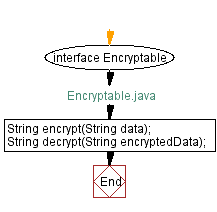
Flowchart of AES Java:
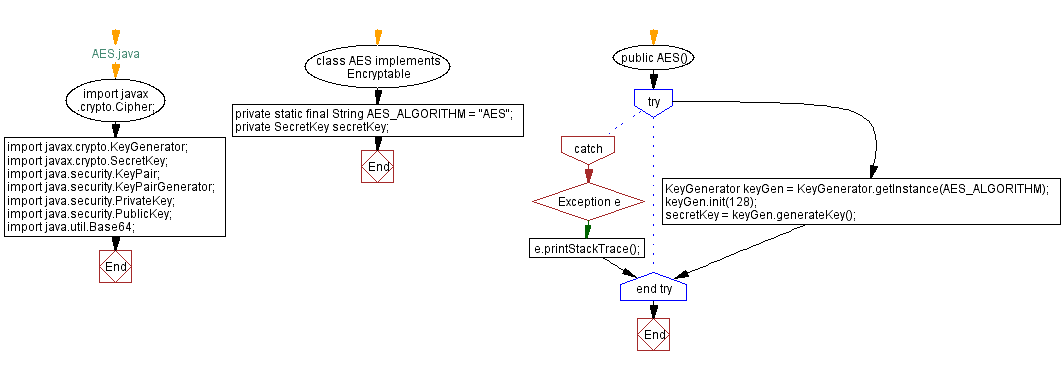
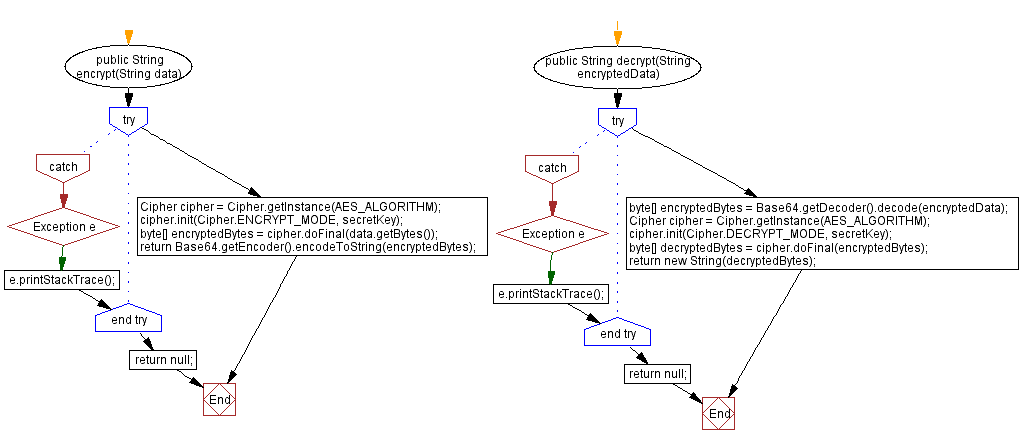
Flowchart of RSA Java:

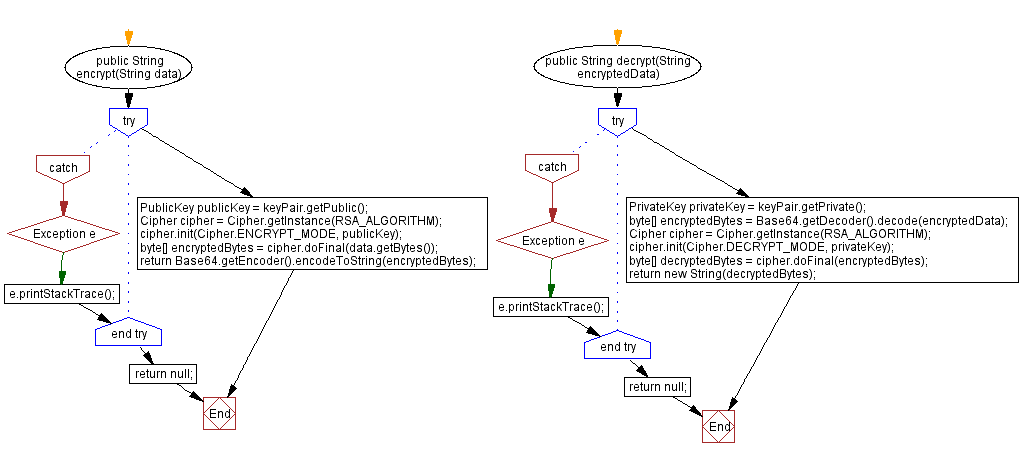
Flowchart of Main Java:
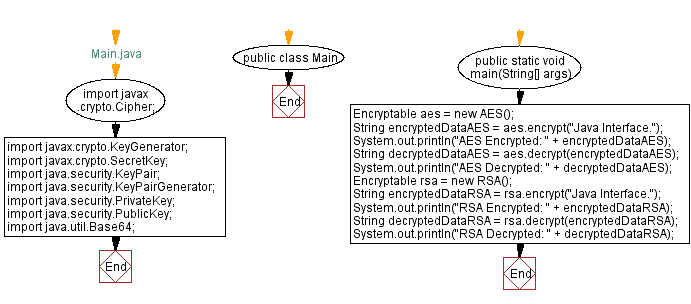
For more Practice: Solve these Related Problems:
- Write a Java program to create an Encryptable interface and implement it in classes for DES and Blowfish encryption algorithms.
- Write a Java program to simulate file encryption and decryption by implementing the Encryptable interface in a FileCipher class.
- Write a Java program to extend the Encryptable interface to support both symmetric and asymmetric encryption methods.
- Write a Java program to implement a generic Encryptable interface that can encrypt various data types (e.g., strings, numbers) using lambda expressions.
Java Code Editor:
Previous: Searchable interface for document and Web page searching.
Next: Sortable interface for quickSort and mergeSort.
What is the difficulty level of this exercise?
